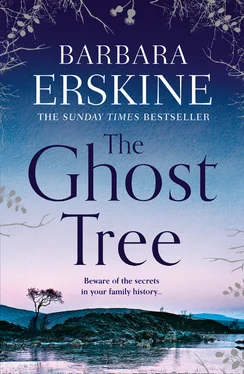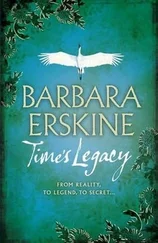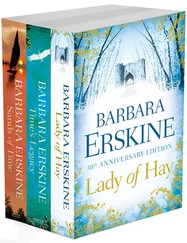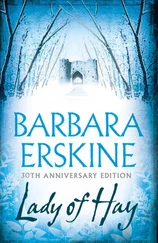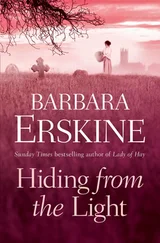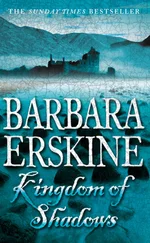It hadn’t occurred to her that Timothy might attack her. It was the house and its contents he wanted; her mother’s treasures. Surely she ought to hide them somewhere they couldn’t be found.
Was there no one in Edinburgh she could go to for help? It was then her thoughts turned to Finlay Macdermott. He had been at school with her ex, and one of their greatest friends. It was worth a try.
‘So, what you’re saying is, you need to hide stolen goods, eh!’ The familiar voice rang out of the phone after she called him and explained the situation. To her relief he had sounded pleased to hear from her.
‘Not stolen!’ she protested. ‘They’re mine. Legally. The solicitor said my mother’s things would almost certainly be deemed to be mine as my father disowned them and locked them away. The law would presume he was planning to pass them on to me.’ She wasn’t sure if that bit was true. ‘They’re probably not worth much either, so I am not cheating the government of tax.’
‘Blow the government!’
She realised suddenly how much she had missed Finlay’s irreverent humour, which used to echo so often down the line from Scotland and around their living room in London.
‘I will be over to see you tomorrow, sweetheart. First thing.’
She smiled as he ended the call.
Whatever had precipitated that final quarrel between her parents had echoed in her head forever afterwards. She must have been very young but her mother’s angry denials and pleas and eventual capitulation had haunted her. It was then that her mother’s precious things had first disappeared. Ruth looked round, trying to remember what Lucy had brought to her husband’s Scottish home from her parents’ house in Sussex. One or two of the more robust items were still there, downstairs, the others, the delicate chairs that Ruth as a small child had loved so much, the spindly-legged tables, had vanished overnight. Where were they? There had been portraits of ladies in exotic clothes and bewigged gentlemen and landscapes and drawings and paintings of houses and castles, horses and dogs. Where were those?
There were two boxes of books still in the cupboard, at the very back; presumably Timothy had felt they were valueless. She hauled them out to join the rest of the items on the floor and began to look through them. These were stories of ancient Scotland, the poetry, the works of Sir Walter Scott, a tattered volume entitled The Lives of the Lord Chancellors which had, she assumed, included her mother’s great-great-great-great-grandfather, the same Lord Erskine who had precipitated her father’s rage. She picked them out, handling them with something like reverence. The Lives of the Lord Chancellors was signed by the author, John, Lord Campbell. She stared at the title page in awe. It was a first edition, published in 1847. She flipped open a shabby leather-bound volume of Sir Walter Scott’s Quentin Durward . Another first edition, signed by the author in 1823, and another signed ‘Byron’. She sat back and took a deep breath. Her ancestors had known these people.
When, all those weeks ago in London, she had started the research it had been relatively easy. All she did was call up Lord Erskine on her laptop, after she had threaded her way through all the different men of that name until she had found the one she wanted.
She had clicked on the entry, feeling almost guilty looking him up, but thinking of him as a historical reality helped start to dispel the lingering miasma of superstitious dislike her father had created around his name. This man was someone her mother had been inordinately proud of.
Thomas Erskine, 1st Baron Erskine KT PC KC (10 January 1750–17 November 1823) was a British lawyer and politician. He served as Lord Chancellor of the United Kingdom between 1806 and 1807 in the Ministry of all the Talents …
He was, it appeared, the son of an earl. That was what her father would have hated most. He would not have resented the fact that the man was a brilliant lawyer, surely, or the fact that to all intents and purposes he was a self-made man. It was the fact that he was the son of the 10th Earl of Buchan, a Scottish aristocrat of ancient lineage, that had got up her father’s nose.
She smiled sadly. Over the last weeks of her father’s life she had put her lurking interest in genealogy to the back of her mind, but suddenly here, tucked into an untidy heap in a long forgotten cupboard box, was all that remained of her mother’s background. She sat cradling Lord Campbell’s book on her knee for several minutes, fighting back her tears, before gently putting it down on the carpet beside her and scrambling to her feet to reach for the writing box.
It was about fifty centimetres long and made of some dark wood, perhaps rosewood or mahogany, inlaid with brass decorations and entwined initials and would when unlocked open to make a writing slope. She lifted it onto the divan. The box was broken. There was a deep splintered gouge around the lock and the delicate mechanism itself had been levered out completely; she found it lying on the floor of the cupboard. The body of the box under the leather and gilt writing surface was empty, as were the surrounding small compartments and drawers. Was it her father who had done this all those years ago, or Timothy on his quiet nights upstairs alone after his host had gone to sleep? Whoever it was had used considerable force to lever it open.
She sat back wondering what, if anything, had been hidden there. There had been a secret drawer in it somewhere. She remembered her mother showing her and chuckling at the little girl’s wonder as it slid out of the side of the box. Picking it up, Ruth shook it experimentally. If there was something inside it would surely rattle. There was no sound. She put it down again and studied it carefully. Where had the secret drawer been? She ran her fingers over every surface. There were no grooves or ridges that she could discern, save for the vicious damage inflicted by chisel or screwdriver; nothing that betrayed any hidden compartment.
Her mother had pressed something. As she cudgelled her memory, an image of the slim questing fingers with their narrow gold wedding ring the only decoration, popped into Ruth’s head. There had been some sort of button inside one of the compartments. There had been a silver-filigree-topped inkbottle there and her mother had lifted it out before pressing the secret place. The inkpot had gone, its former position clearly marked by the faded black stains on the wood. With a sudden surge of hope, Ruth felt the side of the compartment. There was indeed an almost undetectable bump beneath the thin veneer. She pressed it firmly. There was a click but nothing happened.
She pressed again, harder this time. There was no sound. The mechanism, such as it was, had shifted but she couldn’t see any sign of a response. Once more she ran her fingers over the outside of the box and then she felt it: a faint ridge at the bottom of the back panel that hadn’t been there before. She bent closer and tried to insert her fingernail. Slowly and reluctantly a small drawer began to emerge with her coaxing from the body of the box. It was stuffed with some sort of soft material. Intrigued and excited, Ruth unwrapped the delicate silk handkerchief to expose a portrait miniature. She sat staring at the tiny painting in the palm of her hand. It was of a young man; he wore a short white wig, a pale blue coat and a lace ruffle at his throat. She turned it over to see if there was anything written on the back. There wasn’t.
She stared at it for a long time. Whoever had forced open the writing box had missed the secret drawer. She ran her fingers around the back of the drawer once more. It was no more than an inch deep and the handkerchief had stuffed it very tightly, but there was something else wedged in the corner. She pulled out a leather ring box. Inside was a gold signet ring with a blue stone, engraved with some kind of insignia. She slid it onto her forefinger where it hung loosely. The crest, if that was what it was, was difficult to decipher. She would need a better light than this to see clearly what it represented. The last thing in the drawer, also wrapped in a scrap of silk, was a small gold locket on a narrow piece of black ribbon. In it there was a lock of hair.
Читать дальше
